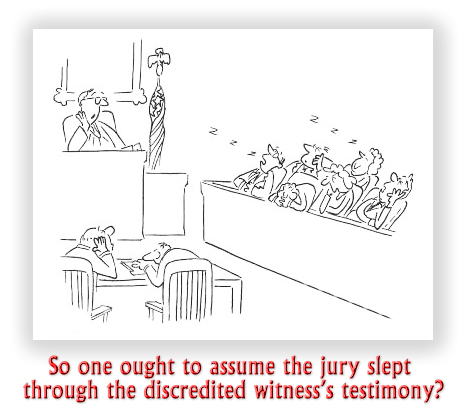We post news and comment on federal criminal justice issues, focused primarily on trial and post-conviction matters, legislative initiatives, and sentencing issues.
IGNORING A BIG WHITE BEAR
 Everyone’s favorite author Leo Tolstoy recounted that as a boy, he was inducted into a childhood secret pact called the “Ant Brothers.” One of the initiation rites was to stand in the corner and not think about a big white bear.
Everyone’s favorite author Leo Tolstoy recounted that as a boy, he was inducted into a childhood secret pact called the “Ant Brothers.” One of the initiation rites was to stand in the corner and not think about a big white bear.
So how do you not think about the bear? In a decision handed down several weeks ago, the 4th Circuit provide no helpful pointers on how to do it, but nonetheless mandates that it must be done.
Next to claims of ineffective assistance of counsel, a Brady v. Maryland claim is probably the most common one raised in post-conviction motions. To make a successful Brady claim, a prisoner has to show that the evidence at issue favorable to him either because it is exculpatory or because it impeaches a government witness; that the evidence was suppressed by the government, either willfully or inadvertently; and the prisoner suffered prejudice because the evidence was material.
Evidence is material if a petitioner can show that there is a reasonable probability that the result of the trial would have been different if the suppressed documents had been disclosed to the defense.
 Tony Juniper asked a federal court to grant him a writ of habeas corpus because Virginia prosecutors withheld evidence that undercut the State’s timeline used to convict him of murder, as well as evidence that would have discredited one of the State’s key witnesses. The district court agreed that the evidence had been withheld, that it indeed gave Tony defenses he never had without the evidence and it undercut the trustworthiness of a star State witness. The problem, the district court said, was that other evidence that it thought proved Tony’s guilt was not affected by the Brady material.
Tony Juniper asked a federal court to grant him a writ of habeas corpus because Virginia prosecutors withheld evidence that undercut the State’s timeline used to convict him of murder, as well as evidence that would have discredited one of the State’s key witnesses. The district court agreed that the evidence had been withheld, that it indeed gave Tony defenses he never had without the evidence and it undercut the trustworthiness of a star State witness. The problem, the district court said, was that other evidence that it thought proved Tony’s guilt was not affected by the Brady material.
In a surprising (and we think welcome) decision, the 4th Circuit reversed, holding that first, the district court failed to “apply the proper legal standard in determining whether Petitioner alleged or established sufficient facts regarding materiality to warrant an evidentiary hearing.” In assessing a Brady claim, a court must construe facts in a light most favorable to the petitioner, and “draw all reasonable inferences in his favor.”
 Second, the district court failed to properly account for the impeachment value of the withheld evidence. In determining whether there is a “reasonable probability” that the result of the trial would have been different, a court must consider “the aggregate effect that the withheld evidence would have had if it had been disclosed,” by adding to the weight of the evidence on the defense side… all of the undisclosed exculpatory evidence” and subtracting from “the weight of the evidence on the prosecution’s side… the force and effect of all the undisclosed impeachment evidence.” This meant the court had to assume that what the witness who would have been discredited said would have been ignored by a skeptical jury.
Second, the district court failed to properly account for the impeachment value of the withheld evidence. In determining whether there is a “reasonable probability” that the result of the trial would have been different, a court must consider “the aggregate effect that the withheld evidence would have had if it had been disclosed,” by adding to the weight of the evidence on the defense side… all of the undisclosed exculpatory evidence” and subtracting from “the weight of the evidence on the prosecution’s side… the force and effect of all the undisclosed impeachment evidence.” This meant the court had to assume that what the witness who would have been discredited said would have been ignored by a skeptical jury.
Finally, the district court cannot make credibility determinations based on a written record alone. In Tony’s case, the judge refused to credit Brady evidence that someone who looked like the murder victim had been seen much later than when Tony could have possibly killed her. The district court reasoned that crediting these statements would require accepting them “over the word of people who claim to have seen the petitioner either at or leaving the crime scene” before 12:44 p.m.
The 4th Circuit complained that “in determining whether a petitioner is entitled to relief… based on undisclosed exculpatory evidence, credibility should be assessed on the basis of an in-court hearing where the judge can see and hear the witnesses.” The district court decided who the jury would have believed without hearing the witnesses on the stand.
This case is a fascinating and detailed instruction manual as to how a district court must analyze a Brady claim. Without thinking about the bear.
Juniper v. Zook, Case No. 13-7 (4th Cir. Nov. 16, 2017)
– Thomas L. Root

